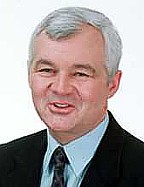Jan Bielecki
Jan Krzysztof Bielecki ( ['jan ˈkʂɨʂtɔf bʲɛˈlɛt͡skʲi] , , born May 3, 1951 in Bydgoszcz , Poland ) is a liberal Polish politician , banker and economist.
Bielecki studied economics of maritime transport at Gdansk University .
From 1980 onwards he was an economic policy advisor to the Solidarność trade union . In 1990 he became a member of the Liberal-Democratic Congress party ( Kongres Liberalno-Demokratieyczny - KLD ), which in 1994 merged with the Democratic Union ( Unia Demokratyczna - UD ) to the Freedom Union ( Unia Wolności - led by the first non-communist Polish prime minister of the post-war period, Tadeusz Mazowiecki ) UW ) joined together. In 2001 Bielecki joined the newly founded citizens' platform ( Platforma Obywatelska - PO ).
From January 12 to December 5, 1991 he was Prime Minister of Poland (list of governments here ); he supported the reforms of his finance minister Leszek Balcerowicz ( shock therapy for the transition from a planned economy to a market economy). In terms of foreign policy, he relied on close cooperation with Germany. He negotiated the German-Polish neighborhood treaty with Federal Chancellor Helmut Kohl , which both of them signed on June 17, 1991. As the first Polish head of government, he visited the German minority in Upper Silesia and thus set another highly regarded signal for the partnership between the two countries. Kohl and Bielicki also initiated the establishment of the German-Polish Youth Office .
At the World Economic Forum in Davos in February 1991, Bielicki asked Poland to cancel 80 percent of its external debt of US $ 46.6 billion. In March some Western European governments enacted Poland 50 percent, the US 70 percent and Brazil 50 percent. At the same time, the IMF and World Bank granted Poland new loans to modernize its economy.
In Hanna Suchocka's cabinet (July 11, 1992 to October 25, 1993) he was Minister for European Integration.
From 1993 to 2003 Bielecki was Poland's representative at the European Bank for Reconstruction and Development . From October 2003 to January 2010 he was CEO of the Polish bank Pekao SA . He then took over the chairmanship of the Advisory Board of the Polish Institute for International Affairs ( Polski Instytut Spraw Międzynarodowych ) in Warsaw. Prime Minister Donald Tusk , who knows him from their time together in Gdansk Solidarność and the KLD, appointed him to head the government's Economic Council ( Rada Gospodarcza ).
Bielecki is married and has two children.
Works
- Frédéric Delouche (ed.): The European history book . From the beginning to the 21st century. Revised and updated edition. Klett-Cotta, Stuttgart 2018, ISBN 978-3-608-96257-4 .
Web links
- Short biography (Polish)
Footnotes
- ^ Wróbel, Piotr J. (2010): Rebuilding Democracy in Poland, 1989-2004 . In MBB Biskupski, James S. Pula, Piotr J. Wróbel (Eds.): The Origins of Modern Polish Democracy. Athens, OH: Ohio University Press. ISBN 978-0821418925 . P. 281
| personal data | |
|---|---|
| SURNAME | Bielecki, Jan |
| ALTERNATIVE NAMES | Bielecki, Jan Krzysztof (full name) |
| BRIEF DESCRIPTION | Polish politician and Prime Minister, member of the Sejm |
| DATE OF BIRTH | May 3, 1951 |
| PLACE OF BIRTH | Bydgoszcz , Poland |

